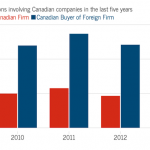Just look at the headlines any given week and you see numerous merger and acquisition (M&A) news. Like it or not, consolidation is a given in all industries, and it looks like 2016 will be a banner year for them in Canada.
Consolidation can often be great for companies, consumers and the market in general. Successful mergers should create operational, financial and managerial synergies, which become a boon to the supply chain and consumers alike; however, not all mergers and acquisitions are successful. In fact, a KPMG study suggested that 83% failed to produce any benefits for shareholders and more than half actually destroyed value.
But when done right, and with the right motivations, consolidation can bring tremendous value to everyone – from shareholders to consumers. And, after all, if something doesn’t create value, why do it in the first place?
2016 – The Year of Acquisitions
I’m told experts are bullish on the amount of cross-border merger activity to expect in—and out of—Canada this year1. This could be thanks to a few factors.
Of course, the Canadian dollar is at a low we haven’t seen in more than a decade, which might attract foreign investors. Acquisitions that seemed expensive a few years ago might be viewed as sweet deals in 2016. Our energy and resources also play a part; a report from Citibank Canada in February suggested energy pressures would drive more activity in that sector this year than last2. And not surprisingly 40% of merger activity in Canada is natural resource-based (oil and gas represents about 12% of that).
 But it’s not just about companies swooping in and buying up Canadian companies. Canada has serious international acquisition swagger. Over the last decade, Canadian firms have bought more foreign firms than vice versa3 and despite our low dollar, Canadian M&As of overseas deals hit a record-setting high last year ($205-Billion in foreign assets) contributing to an eight-year record4.
But it’s not just about companies swooping in and buying up Canadian companies. Canada has serious international acquisition swagger. Over the last decade, Canadian firms have bought more foreign firms than vice versa3 and despite our low dollar, Canadian M&As of overseas deals hit a record-setting high last year ($205-Billion in foreign assets) contributing to an eight-year record4.
All this raises an interesting question: is consolidation a natural evolution?
There are only two ways for businesses to grow: organically or through acquisition. Mergers and acquisitions come in waves, according to scholars. The catalysts change over time, but experts say that since the end of the 19th Century three factors have driven this activity: industrial and technological shocks, regulatory changes and credit availability.
Over a century ago, in the 1890s and early 1900s, acquisitions were a result of companies trying to build monopolies. After the governments enacted laws prohibiting anti competitive behaviour, companies turned away from this sort of extreme “horizontal integration” to more vertical integration, as a means of growth. In the 1920s, as a response to the previously created monopolies, another wave took place when small companies merged and bought each other to compete with the dominant industry player. The depression killed this wave.

A third wave in the 1950s, 1960s and 1970s was about diversifying and creating conglomerates, resulting in holding companies of unrelated businesses. The oil crisis of the 1973 ended this wave. Further waves have occurred in the 1990s and early 2000s (breaking records in the U.S. until the global recession).
As you see, consolidation is a natural response to these market and regulatory forces. But, just as consolidation is affected by the market, it also has a major effect on the market.
Is 2016 the Year of the Acquisition? I’m betting the LBM industry is ripe for consolidation. The question is: will you – the independent dealer – become the acquirer or the acquired? This won’t be the last discussion we have on the subject.
References
- http://www.reuters.com/article/us-canada-m-a-rankings-idUSKBN0UL1R020160107
- http://m.investmentexecutive.com/news/energy-pressures-set-to-drive-canadian-deal-making-in-2016-report-2/
- http://www.canadianbusiness.com/global-report/foreign-mergers-canada-buys-not-sells/
- http://www.theglobeandmail.com/report-on-business/canadian-ma-hits-eight-year-high-on-record-overseas-deals/article27972939/
